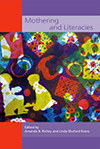 One of the fun things I get to do in the next few weeks (actually, probably days...I think the deadline is soon...) is write a foreword to the book Mothering and Literacies, edited by Linda Shuford Evans and my childhood friend and now motherhood scholar Amanda Richey.
One of the fun things I get to do in the next few weeks (actually, probably days...I think the deadline is soon...) is write a foreword to the book Mothering and Literacies, edited by Linda Shuford Evans and my childhood friend and now motherhood scholar Amanda Richey.Can we take a moment here to acknowledge how weird and cool it is that Amanda and I, growing up in little bitty Cookeville, TN, both became feminist scholars with an interest in parenting? We've crossed paths over the years at the National Women's Studies Association conferences, and she invited me to write the foreword to her forthcoming book.
I'm really enjoying reading the book. The collection of essays addresses a lot of diverse things about being a mother. One of the things that's really striking me this morning is how many of the essays address the expectations our culture has for mothers--and mothers in particular, even though the rhetoric is often the gender-neutral "parents." The expectations are high. It doesn't really matter what your life looks like--the idea is that you'll read to your child, stimulate your child's mind, make every moment of every day a learning moment.
I feel these pressures. I've been feeling them in a particular way over the last ten days, when Maybelle's been sick. If she's awake, she's wanting to do what we got to do in my childhood when we were sick: lie on the couch and watch TV. "Watch-a fee-fee," she'll say. "Watch Homa" (Oklahoma--actually quite good) or "Watch Super Man" (Music Man--also quite good, except she only wants to watch the second half of "Marion the Librarian" and "The Wells Fargo Wagon") or "Watch Shosheph" (Joseph and the Amazing Technicolor Dreamcoat--as bad as the version of Peter Pan she has, and she loves it).
She's either sleeping, or we're snuggling, or she's watching fee-fee. I'm not offering her any intellectual stimulation. Part of this is because she's tired, and part is because I'm attempting to keep up with a full time job while staying home with a sick child. But really, Mothering and Literacies discusses the way that most mothers are encouraged to feel guilty and insufficient for the efforts they're putting forth--efforts that probably aren't quite enough.
In the introduction, Amanda shares, "When I was a doctoral student in literacy and exceptional learning and a mother of babies, I often found myself in a dissonant journey of going straight from a discussion of empirical research about family literacy (i.e. the importance of reading to children from birth) in a night class, to my home where inconsolable babies were clamoring to nurse. I would then read a board book for the requisite 20 minutes through red, blurred eyes. Yet I did it! And now, we all love reading together. So I was a good mother, right? Right?!"
Another author, Jill Bryant, articulates the same anxiety: “The unexpected pressure of being a parent and feeling responsible for the growth and development of my own child made the stakes seem much higher."
The book is quite encouraging: it's not a book that's encouraging me, as a reader, to feel guiltier--to try harder--to pull out the white board this morning and get my daughter to read a few words. Instead, it's a book that's inviting me to be skeptical of the expectations that surround me, and to recognize that much of what I'm already--even automatically--doing with Maybelle is encouraging her to learn, to be "literate," to be a thoughtful and happy member of her community.
And obviously, it's important for any four year old to be able to sing all the lyrics to "I'm Just a Girl Who Can't Say No."
No comments:
Post a Comment